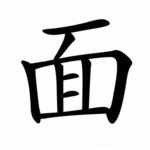Radical 176
Appearance
| 面 | ||
|---|---|---|
| ||
| 面 (U+9762) "face" | ||
| Pronunciations | ||
| Pinyin: | miàn | |
| Bopomofo: | ㄇㄧㄢˋ | |
| Wade–Giles: | mien4 | |
| Cantonese Yale: | min6 | |
| Jyutping: | min6 | |
| Japanese Kana: | メン men / ベン ben (on'yomi) おも omo / おもて omote (kun'yomi) | |
| Sino-Korean: | 면 myeon | |
| Hán-Việt: | diện, miến | |
| Names | ||
| Japanese name(s): | 面/めん men | |
| Hangul: | 낯 nat[1] | |
| Stroke order animation | ||
 | ||
Radical 176 or radical face (面部) meaning "face" is one of the 11 Kangxi radicals (214 radicals in total) composed of 9 strokes.
In the Kangxi Dictionary, there are 66 characters (out of 49,030) to be found under this radical.
面 is also the 180th indexing component in the Table of Indexing Chinese Character Components predominantly adopted by Simplified Chinese dictionaries published in mainland China.
In Simplified Chinese, 面 is also used as the simplified form of 麵/麪 ("noodles" or "flour").
Evolution
[edit]-
Oracle bone script character
-
Small seal script character
Derived characters
[edit]| Strokes | Characters |
|---|---|
| +0 | 面 靣 (=面) |
| +5 | 靤 (=皰 -> 皮) |
| +6 | 靥SC (=靨) |
| +7 | 靦 |
| +12 | 靧 |
| +14 | 靨 |
Sinogram
[edit]The radical is also used as an independent Chinese character. It is one of the Kyōiku kanji or Kanji taught in elementary school in Japan.[2] It is a third grade kanji[2]
References
[edit]- ^ Oh Hyung Min. "Hanja History Trek - Chinese radical entries site". Retrieved 2011-04-07.
- ^ a b "The Kyoiku Kanji (教育漢字) - Kanshudo". www.kanshudo.com. Archived from the original on March 24, 2022. Retrieved 2023-05-06.
Literature
[edit]- Fazzioli, Edoardo (1987). Chinese calligraphy : from pictograph to ideogram : the history of 214 essential Chinese/Japanese characters. calligraphy by Rebecca Hon Ko. New York: Abbeville Press. ISBN 0-89659-774-1.
- Lunde, Ken (Jan 5, 2009). "Appendix J: Japanese Character Sets" (PDF). CJKV Information Processing: Chinese, Japanese, Korean & Vietnamese Computing (Second ed.). Sebastopol, Calif.: O'Reilly Media. ISBN 978-0-596-51447-1.
External links
[edit]Wikimedia Commons has media related to Radical 176.


